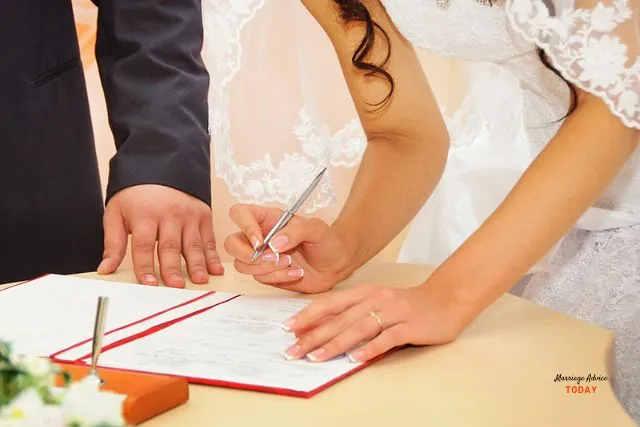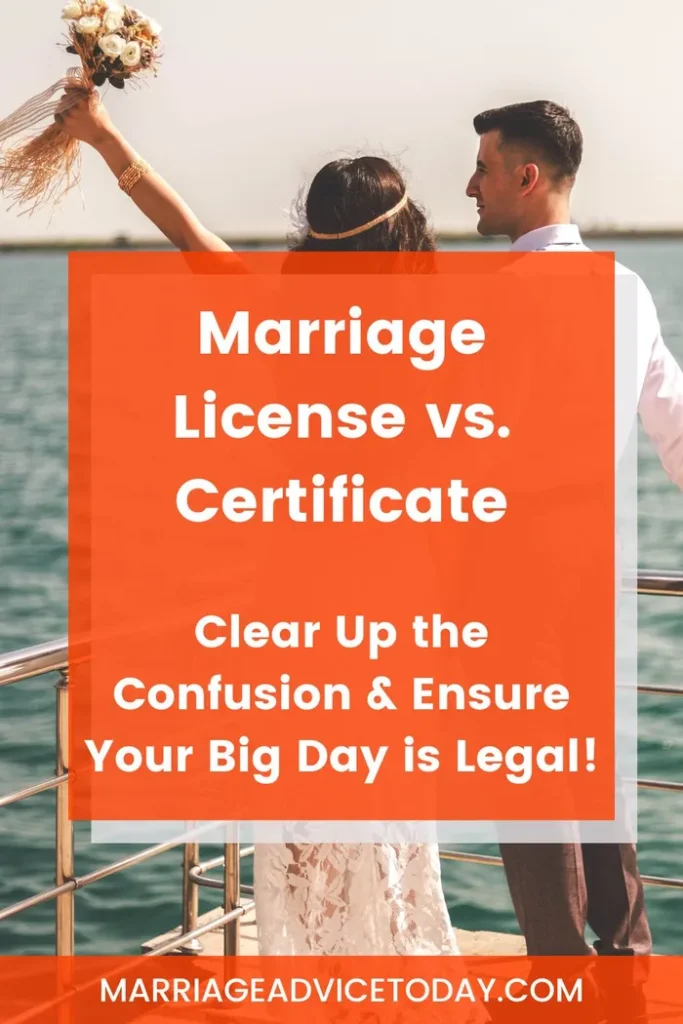Marriage License vs Marriage Certificate: Understanding the Distinctions
This guide explains the two essential documents you’ll need to tie the knot legally: marriage licenses and certificates.
- Marriage License: Think of it as permission to get married. You apply beforehand, and it becomes valid after a waiting period. Signing it during the ceremony activates it.
- Marriage Certificate: Proof that you’re officially married. Issued after the wedding, it’s needed for things like name changes and tax filings.
Both are crucial! Avoid delays and ensure your happily ever after is legal by understanding the differences.
When wedding planning, understanding the difference between a marriage license vs. a marriage certificate is crucial. A marriage license is a legal document that grants a couple permission to marry. Obtaining a marriage license typically involves an application process, including submitting birth certificates and other legal documentation. The license is valid for a limited period and must be signed during the marriage ceremony to become legally binding. After the wedding, a certified marriage certificate is the legal proof that you are legally married. This document is issued by the vital records office in the state where the marriage took place, often after an online application is completed, typically within a week before your wedding. It specifies the date and location of the marriage.
In This Article

Essentials of a Marriage License
A marriage license is the first step towards getting legally married and must be obtained before the marriage ceremony. It’s important to note that marriage licenses expire, so the timing of your application is crucial.
Need to know more about marriage licenses in your state? Check out this handy list.
Once the license is signed during the ceremony, it paves the way for a marriage certificate, proving your union’s legality.
Defining a Marriage License and Its Role in Weddings
A marriage license is an essential document that authorizes couples to get married. With it, the marriage would be recognized by the state. The license typically includes details like the names of the couple, the date of issuance, and sometimes the location where the wedding must occur. Licenses are valid for a set period defined by the issuing authority, which means the wedding must occur within this timeframe for the marriage to be legally recognized.
The role of a marriage license in weddings is multifaceted. It serves as a gatekeeper, ensuring that all legal preconditions for marriage are met before the ceremony can lawfully take place. This includes age requirements, mental capacity, and the absence of any legal impediment to the marriage. Once all conditions are satisfied and the license is issued, it becomes an official record, kicking off the countdown to the wedding day.
Required Documentation to Obtain a Marriage License
Before a couple can receive a marriage license, they must fulfill marriage license requirements, typically presenting valid identification, such as a driver’s license, and providing their legal names. In some cases, additional documentation like a birth certificate or a death certificate, if one of the parties is widowed, may be required. A copy of the marriage certificate from any previous marriage must also be presented if applicable.
The documentation required is dictated by the state’s laws in which the couple intends to marry. These legal statutes aim to prevent bigamy and underage marriages, ensuring that all parties entering into the union have the legal right to do so. Failing to provide the necessary documentation can result in a denial of the marriage license application; thus, couples must be prepared with all required paperwork.
Process and Timeline for Acquiring a Marriage License
The process for acquiring a marriage license varies by jurisdiction but typically involves applying to the local county clerk’s office in person or through an online application. Couples may need to appear together and provide identification and other required documents. The license is issued upon approval and becomes valid after a mandatory waiting period, which differs from state to state. The couple must then ensure that the license is signed during their marriage ceremony within the timeframe that the license is valid, which can range from a few days to several months.
Understanding the timeline is vital to ensure the license expires after the marriage is solemnized. After the marriage ceremony, the officiant and sometimes a witness will sign the license, which is then returned to the county clerk’s office to be filed. This step is imperative as it precedes the issuance of the marriage certificate, which is the ultimate proof of the legal union between the couple.
Marriage Certificates Explained
After the wedding, the signed marriage license is filed, and a marriage certificate is issued. This document is the official record that validates the marriage as legally binding and is essential for various legal processes post-wedding.
Marriage Certificate: Your Legal Proof of Marriage
The marriage certificate is an official document that serves as proof of marriage. It is typically issued by the county clerk’s office where the marriage license was filed after the wedding. This certificate is often required for legal name changes, applying for spousal benefits, and for record-keeping purposes in the vital records office in the state. It is important to have copies of your marriage certificate stored in a safe place, as they may be needed for future legal transactions.
The Procedure for Obtaining a Marriage Certificate Post-Wedding
Once the marriage ceremony is complete and the license is signed, the officiant is responsible for returning the license to the issuing office. The couple can then request a certified copy of the marriage certificate for their records. The procedure for obtaining this certificate typically involves submitting a request to the vital records office in the state where the marriage occurred, often accompanied by a small fee. Some states may offer the option to request this document online or via mail.
It is recommended to obtain several certified copies of the marriage certificate, as they may be needed for various purposes such as updating social security records, changing names on bank accounts, and other legal processes. Keeping extra copies ensures you have them readily available whenever the need arises without going through the request process each time.
Navigating the Legal Landscape of Marriage Documentation
Understanding the legal nuances of marriage documentation is key to ensuring your marriage is recognized by the law. It involves navigating through the requirements of marriage licenses and certificates, each serving distinct purposes in the marital process.
Can You Get Married Online? Understanding the Digital Age Possibilities
In the digital age, getting married online has become a topic of interest for many couples. While it is possible to complete the application process for a marriage license online in some states, a legal wedding still requires the couple to physically appear before an officiant and a witness to tie the knot. There are also virtual ceremonies, but the legalities of such marriages depend on the laws of the jurisdiction where the marriage is registered.
For those looking to get married online, it’s important to distinguish between the online marriage license application and the actual marriage ceremony. Although you may start the process digitally, most jurisdictions require you to be present in person to solidify your union legally. Always check local laws to understand what constitutes a legal wedding in your area.
Here’s a list of states that allow online marriages.
Beyond the Vows: Ensuring Your Union is Legally Recognized
Maintaining the legal recognition of your marriage hinges on properly filing and handling your marriage documentation, such as the license and certificate.
The Significance of Legal Documentation in Marriage
Legal documentation serves as the bedrock for the recognition of a marriage within the eyes of the law. A marriage certificate, in particular, is a crucial document that proves the legality of your union, both domestically and internationally. It is often required for numerous legal processes, including tax filings, insurance coverage, and estate planning.
Ensuring All Legal T’s are Crossed, and I’s are Dotted
Finalizing your marriage legally requires attention to detail. Each step should be approached with care from the moment you apply for a marriage license to the day you file your signed marriage certificate. It’s critical to adhere to the specific requirements set forth by your jurisdiction, which may include witness signatures and officiant credentials.
The I Do’s and the Documentation: Deciphering Marriage Paperwork
Understanding the nuances of marriage documentation is crucial to ensuring that your union is legally recognized. In Montgomery County, as in many other jurisdictions, the marriage process involves interactions with the county clerk’s office, which provides guidance and advice to couples on fulfilling their legal obligations.
It’s essential to be familiar with the relevant code sections that govern marriage in your locality, as these statutes outline the requirements for a valid marriage. By thoroughly preparing and submitting the correct paperwork, couples can guarantee that their marriage is not just a ceremonial bond but a legally binding contract recognized by the state.





